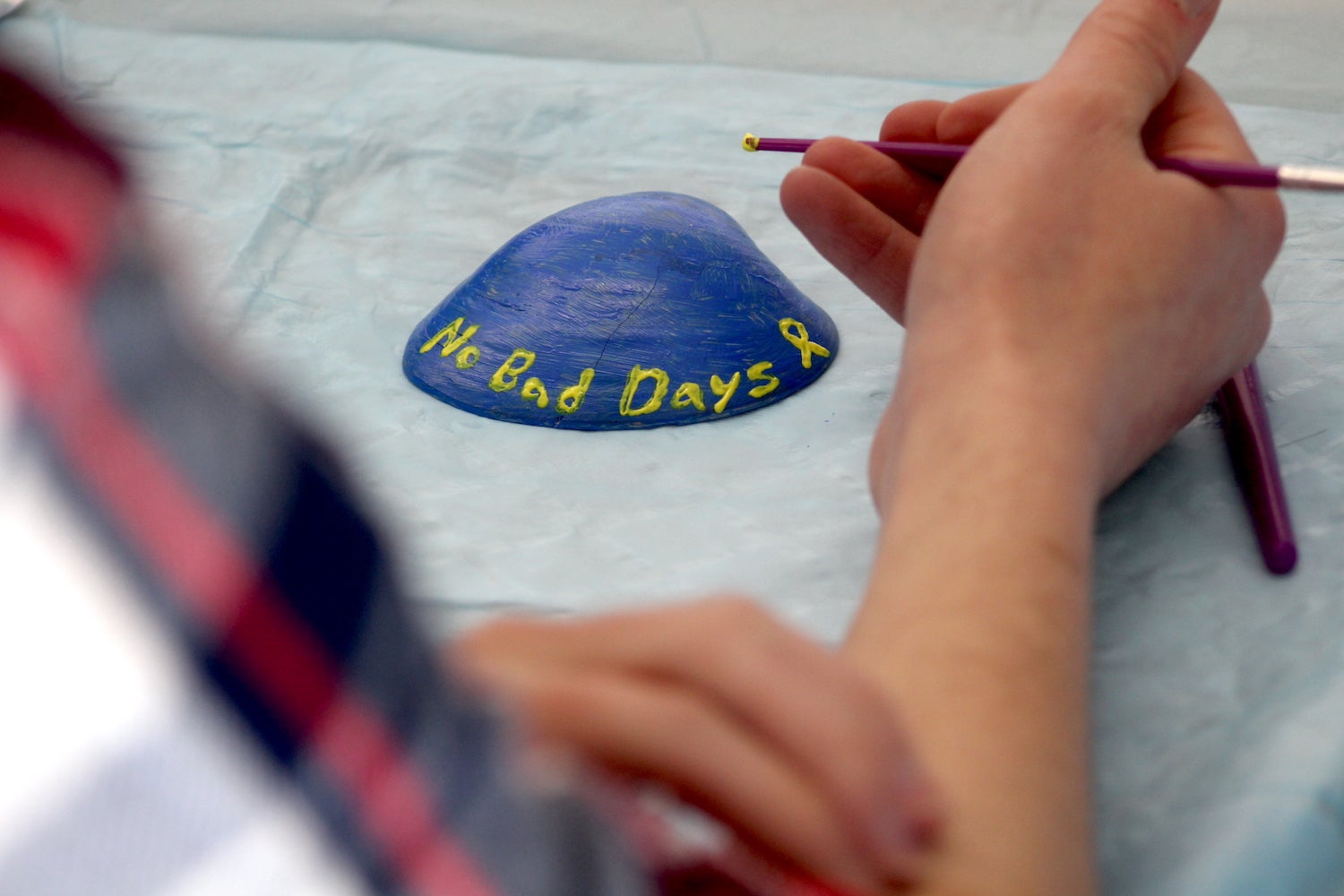‘Shells for Sean’ tribute remembers grandson of pharmacy professor, spreads awareness of childhood cancer
University of Rhode Island College of Pharmacy students are learning about childhood cancer and the impact it has on young patients and their families, while contributing to a lasting tribute to a young boy gone too soon.
Sean MacDonnell was just four years old in 2018 when he was diagnosed with a rare, aggressive cancer known as rhabdomyosarcoma. Given that this cancer afflicts only about 350 children in the United States a year, treatments were virtually non-existent and clinical trials had few patients included. In fact, Sean, grandson of pharmacy Professor Celia MacDonnell, was often the only patient being studied in the trial. Despite the long odds, Sean kept fighting, kept taking part in every clinical trial, and kept his spirits up throughout everything, until he was unable to continue fighting and passed away last August at age 8.
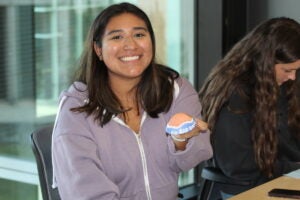 “He lived with it since his fourth birthday, when he started his first clinical trial,” MacDonnell said. “Every day in the U.S., about 45 children are diagnosed with cancer, and yet only 4 percent of federal funding goes to pediatric cancer research. It is also very difficult to do clinical trials on kids; parents and pharmaceutical companies are reluctant. That is something we kind of want our students to pick up on… What does it take? What do people go through during clinical trials? What effect does it have on families? We want them to think of everything; what the patient is going through, what it takes to get that drug to the point that now we know it works. It starts with these children. Adults are not the only ones who are involved in drug trials.”
“He lived with it since his fourth birthday, when he started his first clinical trial,” MacDonnell said. “Every day in the U.S., about 45 children are diagnosed with cancer, and yet only 4 percent of federal funding goes to pediatric cancer research. It is also very difficult to do clinical trials on kids; parents and pharmaceutical companies are reluctant. That is something we kind of want our students to pick up on… What does it take? What do people go through during clinical trials? What effect does it have on families? We want them to think of everything; what the patient is going through, what it takes to get that drug to the point that now we know it works. It starts with these children. Adults are not the only ones who are involved in drug trials.”
Fellow professors Margaret Charpentier and Britney Brown wanted to help pay tribute to their colleague’s grandson while also adding an educational component to their oncology pharmacy classes. So they enlisted the students to take part in “Shells for Sean,” an online tribute in which participants paint colorful designs on seashells and leave them somewhere for a stranger to find. A message inside asks anyone who finds a shell to take a picture and add it to the “Shells for Sean” public Facebook page.
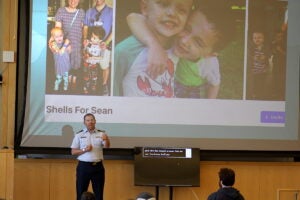
The professors hosted Sean’s father, Coast Guard Lt. Commander George MacDonnell, who delivered an emotional presentation in class about his son’s, and his family’s, long struggle. He described his son as the toughest person he’s ever known, playing baseball up to two weeks before his passing, and insisting on staying awake for all his MRIs and scans, all while never complaining about the pain, the stress and worry, or the impact on his ability to just be a kid.
Between regular trips to Boston for infusions and radiation treatments, Sean continued to live the life of a young boy, playing with his older brother, Owen; playing baseball, and watching the New York Mets play. He got the opportunity to throw out the first pitch at Citi Field before a Mets game, received a video message from former Boston Red Sox shortstop Xander Bogaerts, and got a personal tour of the New England Patriots locker room from Special Teams Captain Matthew Slater.
“He impacted a lot of people, but he was just like a regular kid. He never complained,” George MacDonnell said. “You will have never met a tougher person in your life.”
George MacDonnell also talked about the care he received from providers, most of which was exemplary, but some of which could have been delivered more sensitively. He reminded the students of the need to see the patient not just as a patient, but as a person.
“One doctor told us it’s highly possible the medications will make Sean sterile,” George MacDonnell told the students. “She said it very casually, like it was very matter-of-fact and scientific. The human element just wasn’t there. It’s important just to know someone’s there, someone cares. As burgeoning providers, just remember, there is a person on the other end.”
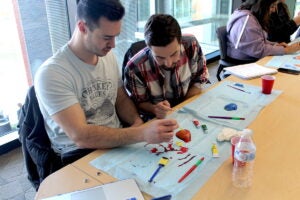 Since MacDonnell’s visit, students and faculty members have been collecting shells on Narragansett Beach and painting them with various designs. As the students studying oncology leave the College of Pharmacy to begin their Advanced Pharmacy Practice Experiential rotations for their last year in the Pharm D program, they will take the shells with them and place them on their journey so that random people might find them and learn about Sean and childhood cancer. While giving Sean’s family a lasting tribute and a way to remember their beloved son, the URI students also get a lesson in compassionate care, Charpentier said.
Since MacDonnell’s visit, students and faculty members have been collecting shells on Narragansett Beach and painting them with various designs. As the students studying oncology leave the College of Pharmacy to begin their Advanced Pharmacy Practice Experiential rotations for their last year in the Pharm D program, they will take the shells with them and place them on their journey so that random people might find them and learn about Sean and childhood cancer. While giving Sean’s family a lasting tribute and a way to remember their beloved son, the URI students also get a lesson in compassionate care, Charpentier said.
“Our career goal is to help others,” she said. “So we thought we would end the semester with this message: Let’s put the patient first.”
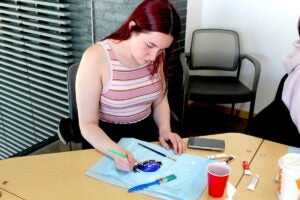 The Shells for Sean Facebook page will help to raise public awareness of the struggles Sean and children like him face.
The Shells for Sean Facebook page will help to raise public awareness of the struggles Sean and children like him face.
“If anyone finds a shell, please take a photo and post it on the Shells for Sean Facebook page,” Celia MacDonnell said. “Students will take them on rotations, so they’ll take them all over the country and the world. The family will be able to track where the shells end up as a lasting tribute to Sean. In addition to the tribute, it’s really for children’s cancer awareness. These are people going through a lot. Hopefully this can help.”

